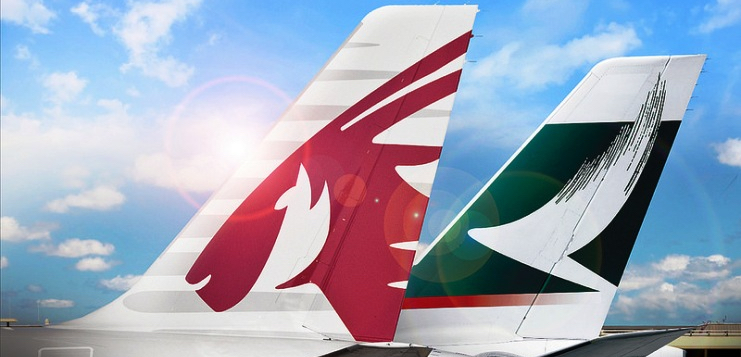Qatar Airways will spend $600MN to secure a 9.6% stake in Cathay Pacific. What is Qatar Airways’ strategy in this latest acquisition?
Qatar expects the deal to close today, meaning it has been in the works for quite some time. CEO Akbar Al Baker heaped praises on Cathay, calling it “one of the strongest airlines in the world, respected throughout the industry and with massive potential for the future”.
Meanwhile, Cathay Pacific has not released a statement yet on the matter. The Hong Kong carrier has been bit hard with regional competition and reported a loss of nearly $300MN for the first half of 2017.
Although Qatar failed in its bid to acquire a 10% stake in American Airlines, it will own:
- 10% – Cathay Pacific
- 20% – British Airways
- 10% – LATAM
- 49% – Meridiana
Cathay Pacific, British Airways, and LATAM are all members of the oneworld alliance?
Cathay Pacific’s ownership also includes a 35% stake by Swire Pacific and a 30% stake by Star Alliance member Air China.
Does Qatar Pick Winners (and Etihad Losers)?
Etihad also invested heavily in other airlines, hoping to ease regulatory burdens and find synergies to drive profit.
They failed miserably.
Air Berlin is now defunct. Alitalia is operating in bankruptcy protection. Etihad Regional has been sold. Now even Jet Airways looks like it could end its year in the red.
But objectively, Qatar has invested in a very different bread basket of airlines. British Airways profits are strong. LATAM has a strong hold on the Latin America market. And Meridiana has great potential, especially if Alitalia falters.
Then there is Cathay Pacific…often heralded as a gold standard among carriers. There is no doubt Cathay Pacific’s quality cannot be questioned. But the carrier simply isn’t earning profits. It offers remarkable full-service, like Qatar Airways, but is that sustainable? Cathay Pacific now faces a difficult dilemma like Singapore and Thai: embrace the full-service model or start trimming. Neither seem like clear winners to me, through I no longer argue a carrier cannot cut its way to profit (thanks British Airways).
CONCLUSION
If Cathay just had a bad year due to poor fuel hedging, it should bounce right back. I tend to think Cathay’s problem are deeper than that. In any case, a closer working relationship between Qatar and Cathay should lead to benefits for consumers, at least on a short-term basis. The real question will be whether Qatar will see long-term benefits and how it may try to change Cathay Pacific.
image: Qatar Airways





Just one comment, where do you see Jet Airways in the red? They had a profitable Q1 and Q2 results haven’t been announced. So which insider is feeding you this stuff?
I didn’t say they were in the red…just that it has fallen.
http://www.livemint.com/Companies/NkFkSd88DMDavG9T3XLbZI/Jet-Airways-Q4-profit-falls-about-91.html
Why does everyone think that CX is “the gold standard’ of airlines? I respect your opinions, but when I flew CX, I paid in cash for a business class ticket from BOS to PNH via HKG. The experience was abysmal to say the least. The cabin crew made it crystal clear that they did not want to be there. Service was painfully slow, every request I made was met with a pout, and basic things such as refills had to be asked for. Food was also terrible for such an esteemed carrier. I, at first thought that this was a one off, but my grandparents, aunts, and great grandmother experienced the same on a revenue J ticket. Least to say thiss is over 20k wasted for someone to look down upon us. CX will never get my business again.
Because I’ve flown them.
I’ve flown CX many times over the last decade in paid J (and an occasional paid F) and never had a bad experience. Food, Crew, lounges and J/F seating have always been fantastic. Even the couple of Y flights I’ve had HKG-JFK were good.
I thought Swire owns 45% instead of 35%?
There is no reason to believe that this will lead to “a closer working relationship” between CX and Qatar — though the opposite is just as likely to be true. Neither CX nor Swire had absolutely anything to do with Qatar’s purchase of shares which had been accumulated by the seller on the Hong Kong Stock Exchange. They are now a minority passive investor, just like every other public owner of CX shares. Their investment gets them 10% of voting rights in a company in which Swire and CA are firmly in control of the vast majority of shares. Unlike some of Qatar’s other investments, this one was made without any cooperation from management, and they should not expect any warm welcome at the next shareholders’ meeting, much less any meeting or cooperation with management.
Exactly.
We will see. I believe Qatar could choose far more lucrative investments than airlines if it did not have ulterior motives.
Qatar’s motivations aren’t really any more relevant than any other minority shareholder — which with two controlling shareholders with interlocking ownership, gives Qatar as much of a say in how the company is managed as non-shareholder’s have. 10% of the shares will get them zero Board Seats.
But I think Qatar is smart enough to understand that, and not to be fooled into thinking that they are buying any influence over CX. Qatar is likely motivated by a classic petrodollar problem, of having too much cash, and the need to put it into any stable overseas assets that they can find.
I find this fascinating and more than a little confusing. I don’t see many synergies here in terms of networks. In fact a one of the “stressors” to CX in the past few years has arguably been QR joining Oneworld and competing for Cathay’s premium passengers between Asia and Europe. I can’t see a closer working relationship (eg revenue sharing agreements on certain routes etc) benefitting anyone expect Cathay. Indeed CX tried operating an addional daily codeshare frequency to Doha for a while then dropped it. As has already been pointed out this investment was apparently made without Swire’s active participation anyway.
Presumably QR has some strategy/motivation here beyond “having too much money” (there are plenty of airlines to invest in – why CX). Can’t wait to see what it is.
Presumably QR has some strategy/motivation here beyond “having too much money” (there are plenty of airlines to invest in – why CX). Can’t wait to see what it is.
No, it is safe to presume that Qatar needs an investment vehicle to diversify out of cash. This is the classic problem for the Gulf Oil Monarchies, and these sorts of investments are what they do with excess cash which otherwise would earn essentially no interest and present an undiversified risk profile. Airlines are businesses in which these governments (and the families who own them) can park a lot of cash, a risk profile which is inverse to that of energy prices, and little sovereign/geopolitical risk which is endemic in the Middle East. It is entirely possible — in fact likely — that one day Qatar (or UAE/Bahrain/Etc.) will cease to exist as a Kingdom ruled and essentially owned by the Emir, but the Emir and his family will still be able to rely upon assets like these outside of the reach of whatever force that topples them.